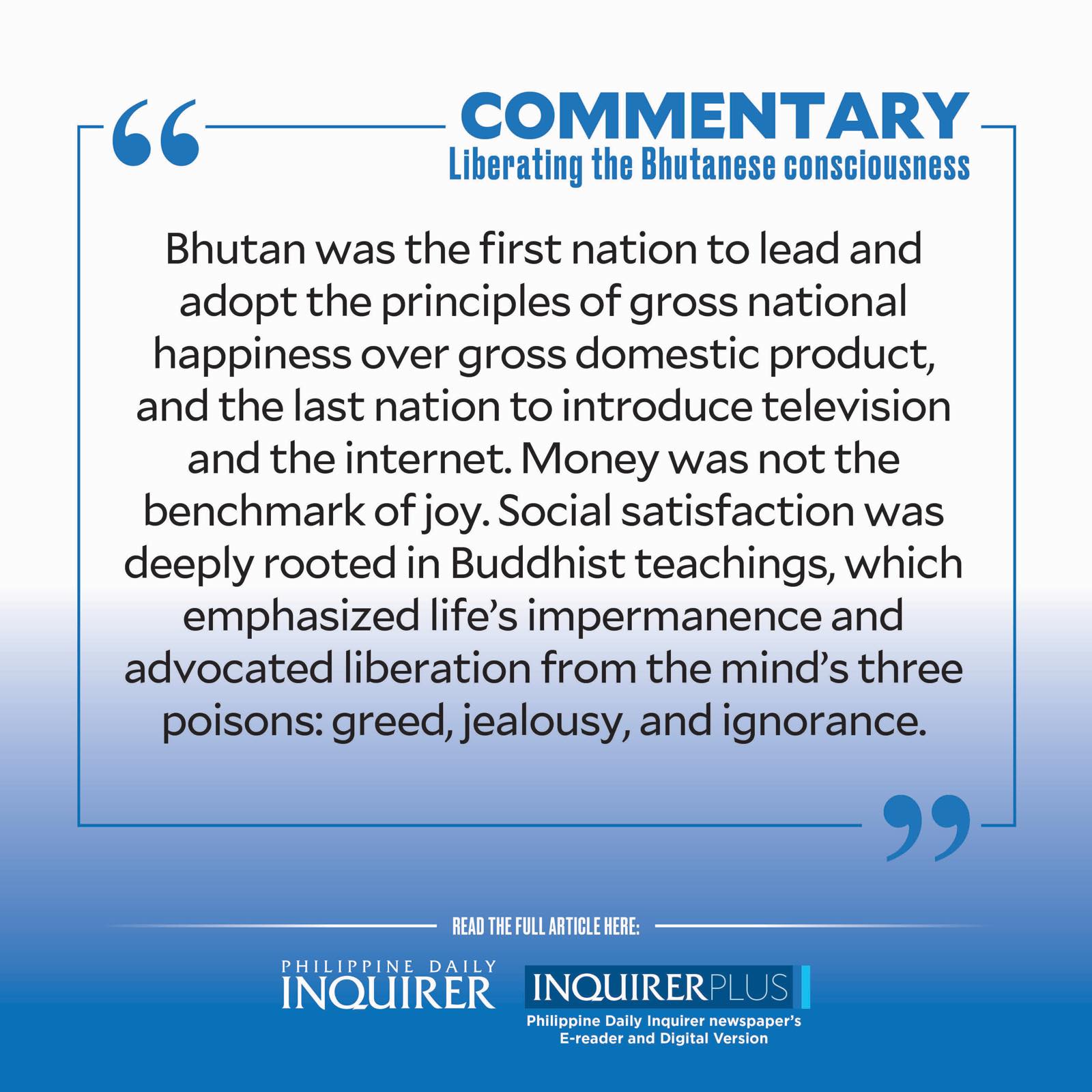Liberating the Bhutanese consciousness

Bhutan, often called Shangri-la, has long held a special position in the world. Nestled between the Asian powerhouses India and China, it stands out not only as a carbon-negative nation but also as an exemplar of the Buddhist kingdom. The small population of 800,000 who preserve its Buddhist soul has always strived to create its own path in a rapidly changing modern world.
Bhutan was the first nation to lead and adopt the principles of gross national happiness (GNH) over gross domestic product (GDP), and the last nation to introduce television and the internet. Before the introduction of globalized formal banking, its largely self-sufficient economy prospered on the joys of community sharing. Money was not the benchmark of joy. Social satisfaction was deeply rooted in Buddhist teachings, which emphasized life’s impermanence and advocated liberation from the mind’s three poisons: greed, jealousy, and ignorance.
Article continues after this advertisementThis moral compass extended to the voluntary introduction of democracy, an extraordinary move rooted in human values and wisdom. This was a significant step, given the deep reverence the Bhutanese people have for their monarchy. Having avoided colonization, Bhutan remains today at a crossroad between its rich traditions and the demands of the modern world. The challenge is to balance the benefits of modernization while preserving the unique cultural and spiritual heritage that makes Bhutan special.
While Bhutan’s governance remains steadfastly rooted in its moral principles and the vision of GNH, with royalty offering essential guidance, a pressing question arises: what is causing the increasing divergence among its populace from their ideals? Some saw the arrival of TV and the internet in 1999 as a form of mental colonization. Modern media, too, may have caused profound subliminal shifts in the people’s cultural perspectives under the guise of modernism. But the issue runs deeper.
Bhutan gave the vision of GNH to the world but innocently leaned on Western GDP-style institutions and models to realize these ideals. The challenge with these socioeconomic institutions—including contemporary banking, monetary, and corporate structures—is the deeply inherent worldview that sees humans as dominators of nature, primarily driven by profit. Consequently, when Bhutan absorbed these institutions, it inadvertently incorporated these dominative ethe. Engaging with this framework implies an emphasis on profit, rivalry, and individualism, often sidelining core values of truth, morality, unity, and cooperation.
Article continues after this advertisementThis contradiction poses a profound dilemma for Bhutan’s Buddhist entrepreneurs, as it conflicts with their foundational principles. As is well known, the capitalist dynamic intensifies the societal divide between the affluent and the less fortunate, propelling previously self-sustaining rural communities toward urban centers or foreign lands, driven by the allure of consumer-driven, materialistic lifestyles. The mind of the populace begins to subconsciously gauge success not by native benchmarks—after all, many Bhutanese villagers arguably enjoy a richer life than many Europeans or Americans—but by the Western standards of money. Instead of prioritizing sharing and caring, life becomes transactional. Thus, though Bhutan was never subject to territorial colonization, it is now grappling with a subtler form of encroachment—systemic and psychological colonization, risking its age-old tenets of self-sufficiency, community unity, and spiritual growth in pursuit of modernity.
Faced with this reality, if Bhutan aspires to hold true to its values and its unique path ahead, it needs to empower the masses to recognize and liberate their consciousness from these insidious forms of mental invasion. One roadmap could be to develop a nature-based knowledge economy grounded on a social enterprise institutional model. This requires harmonizing education, technology, and socioeconomic systems with their deep spiritual, cultural, and artisanal roots that can provide an antidote to mental colonization. It necessitates consensus and profound progression in thought and experimentation built upon the foundations of the ancestral heritage.
While conventional development emphasizes tangible outcomes, Bhutan’s vision necessitates an equal emphasis on nurturing the right intangible environment, creating a holistic and sustainable approach to development. Perhaps decolonizing the Bhutanese mind should be built from the village level up: after all, most cities arose from the conglomeration of villages.
There is no single path toward finding what the populace wants and needs in an ever-changing world. The Bhutanese identity is to shoulder the responsibility of upholding the spirit of “Bhutan that is Drukyul,” or face assimilation into the ever-homogenizing narrative of globalization. Asia News Network
—————-
Andrew Sheng is distinguished fellow of Asia Global Institute, University of Hong Kong, and chair of the George Town Institute of Open and Advanced Studies, Wawasan Open University, Penang. Sneha Poddar is a qualified chartered accountant, a research fellow at Georgetown Institute of Open and Advanced Studies, an associate of the Global Soil Health Programme: University of Glasgow, and an adjunct faculty member at the Himalayan Institute of Alternatives Ladakh.
—————-
The Philippine Daily Inquirer is a member of the Asia News Network, an alliance of 22 media titles in the region.
















